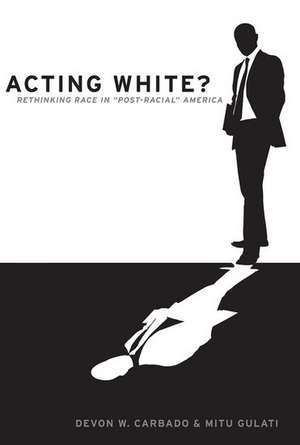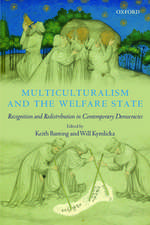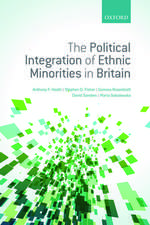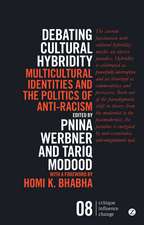Acting White?: Rethinking Race in Post-Racial America
Autor Devon W. Carbado, Mitu Gulatien Limba Engleză Paperback – 7 mai 2015
| Toate formatele și edițiile | Preț | Express |
|---|---|---|
| Paperback (1) | 162.29 lei 31-37 zile | |
| Oxford University Press – 7 mai 2015 | 162.29 lei 31-37 zile | |
| Hardback (1) | 306.47 lei 31-37 zile | |
| Oxford University Press – 21 mar 2013 | 306.47 lei 31-37 zile |
Preț: 162.29 lei
Preț vechi: 198.28 lei
-18% Nou
Puncte Express: 243
Preț estimativ în valută:
31.06€ • 32.31$ • 25.64£
31.06€ • 32.31$ • 25.64£
Carte tipărită la comandă
Livrare economică 04-10 aprilie
Preluare comenzi: 021 569.72.76
Specificații
ISBN-13: 9780190229214
ISBN-10: 0190229217
Pagini: 212
Ilustrații: 11 photographs
Dimensiuni: 231 x 155 x 15 mm
Greutate: 0.32 kg
Editura: Oxford University Press
Colecția OUP USA
Locul publicării:New York, United States
ISBN-10: 0190229217
Pagini: 212
Ilustrații: 11 photographs
Dimensiuni: 231 x 155 x 15 mm
Greutate: 0.32 kg
Editura: Oxford University Press
Colecția OUP USA
Locul publicării:New York, United States
Recenzii
Courageous, poignant, and amusing too, Acting White? takes us deep into the way racial identity operates in everyday life. Carbado and Gulati focus on 'working identity' and explore the 'racial double binds' that blacks-and others too-confront today. Intersectionality figures prominently as well: gender and class dynamics receive serious attention. The treatment of Barack Obama's racial identity is particularly valuable. A brilliant analysis of how race is experienced: in the workplace, in the university, on TV, and in racial profiling, Acting White does some deep racial theorizing in a very approachable way.
This book is audacious. It takes on a racial phenomenon that few people talk openly about-namely, that decision-makers screen African Americans to ascertain whether they are "good blacks" (racially palatable) or "bad blacks" (racially unpalatable). Carbado and Gulati powerfully explain the incentives this creates for African Americans to 'work' (strategically present) their identities to avoid being perceived as 'bad' or too racially salient. Whether you agree or disagree with them, Acting White? is creative, provocative, and a treat to read. After reading this irreverent, witty, and jargon-free book, you will not be able to think about race in the same way.
Now that you've picked it up, you would have to be crazy to set this book down. You know you're curious to learn whether and how you're Acting White. And you need to learn the performance secrets, and the performance expectations, of your friends, your colleagues, your boss. Acting White? brilliantly violates a taboo, by exposing something that secretly we all sometimes do.
Carbado and Gulati's compelling book is brilliant, eloquent, and accessible to non-legal scholars. It is reminiscent of the most provocative courtroom scenes in its arguments about the nuances and limitations of anti-discrimination law, especially with respect to intra-racial discrimination, a concept that is likely to be unfamiliar to many lay readers. Their analysis of President Obama's appointment of the first Latina to the Supreme court, Sonia Sotomayor, the dual constructions of Michelle Obama as both 'racially palatable' and 'racially unpalatable,' and affirmative action admission decisions in higher education are riveting in light of contemporary diversity discourse.
Provocative and thought provoking, Carbado and Gulati have written an essential book on the incredible complexities of defining race.
Law students will like Acting White because it is an easy read and it can help those who need to know how to navigate law firms when identity issues come up. Readers wanting to know how to create a working identity they can live with and not feel as though they are selling out can refer to the authors' discussion of four stages of racial negotiation. This book has much to offer and is a must for any library.
This book is audacious. It takes on a racial phenomenon that few people talk openly about-namely, that decision-makers screen African Americans to ascertain whether they are "good blacks" (racially palatable) or "bad blacks" (racially unpalatable). Carbado and Gulati powerfully explain the incentives this creates for African Americans to 'work' (strategically present) their identities to avoid being perceived as 'bad' or too racially salient. Whether you agree or disagree with them, Acting White? is creative, provocative, and a treat to read. After reading this irreverent, witty, and jargon-free book, you will not be able to think about race in the same way.
Now that you've picked it up, you would have to be crazy to set this book down. You know you're curious to learn whether and how you're Acting White. And you need to learn the performance secrets, and the performance expectations, of your friends, your colleagues, your boss. Acting White? brilliantly violates a taboo, by exposing something that secretly we all sometimes do.
Carbado and Gulati's compelling book is brilliant, eloquent, and accessible to non-legal scholars. It is reminiscent of the most provocative courtroom scenes in its arguments about the nuances and limitations of anti-discrimination law, especially with respect to intra-racial discrimination, a concept that is likely to be unfamiliar to many lay readers. Their analysis of President Obama's appointment of the first Latina to the Supreme court, Sonia Sotomayor, the dual constructions of Michelle Obama as both 'racially palatable' and 'racially unpalatable,' and affirmative action admission decisions in higher education are riveting in light of contemporary diversity discourse.
Provocative and thought provoking, Carbado and Gulati have written an essential book on the incredible complexities of defining race.
Law students will like Acting White because it is an easy read and it can help those who need to know how to navigate law firms when identity issues come up. Readers wanting to know how to create a working identity they can live with and not feel as though they are selling out can refer to the authors' discussion of four stages of racial negotiation. This book has much to offer and is a must for any library.
Notă biografică
Devon Carbado is Professor of Law at University of California, Los Angeles. Mitu Gulati is Professor of Law at Duke University.














